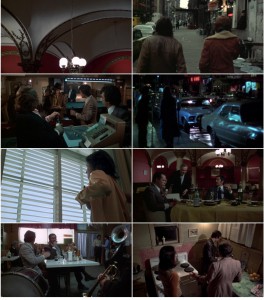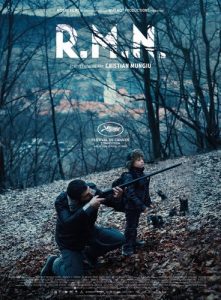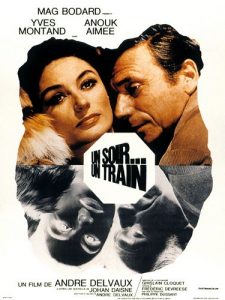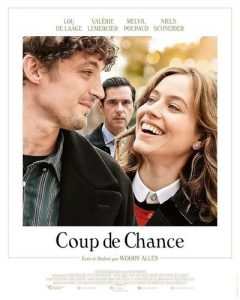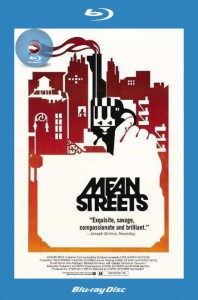
The future is set for Tony and Michael – owning a neighbour- hood bar and making deals in the mean streets of New York city’s Little Italy. For Charlie, the future is less clearly defined. A small-time hood, he works for his uncle, making collections and reclaiming bad debts. He’s probably too nice to succeed. In love with a woman his uncle disapproves of (because of her epilepsy) and a friend of her cousin, Johnny Boy, a near psychotic whose trouble-making threatens them all – he can’t reconcile opposing values. A failed attempt to escape (to Brooklyn) moves them all a step closer to a bitter, almost preordained future.
Director: Martin Scorsese
Writer: Martin Scorsese (screenplay), Mardik Martin (screenplay), Martin Scorsese (story)
Actors: Robert De Niro, Harvey Keitel, David Proval, Amy Robinson
The future is set for Tony and Michael – owning a neighbour- hood bar and making deals in the mean streets of New York city’s Little Italy. For Charlie, the future is less clearly defined. A small-time hood, he works for his uncle, making collections and reclaiming bad debts. He’s probably too nice to succeed. In love with a woman his uncle disapproves of (because of her epilepsy) and a friend of her cousin, Johnny Boy, a near psychotic whose trouble-making threatens them all – he can’t reconcile opposing values. A failed attempt to escape (to Brooklyn) moves them all a step closer to a bitter, almost preordained future.
Martin Scorsese’s brutal and benevolent Mean Streets is a milestone of American cinema. Its release in 1973 pronounced the realization of a major talent in contemporary cinema, and the film has lost none of its potency, containing as much strength and heart now as it did over three decades ago.
During the Feast of San Gennaro, the streets of Manhattan’s Little Italy become an inferno of desire, emotion, and violence. Charlie (Harvey Keitel) works for his Mafia boss uncle, Giovanni (Cesare Danova), as a money collector. His job leads Charlie into the grime of society, and he spends most of his time at his friend Tony’s (David Proval) strip club, night after night, and Tony works hard to keep the place clean from heroin addicts and the violent antics of Johnny Boy (Robert De Niro, in his breakout performance). Unlike those around him, Charlie has aspirations outside of crime and petty theft, holding out hope that his uncle will aid him in his quest to own a restaurant.
Charlie is one of Scorsese’s most complex characters, because he is a nice guy who wants to break out of the confinements of the world around him, but ultimately is unable to do so, due to his own prejudices and pride. The film opens with him looking into the mirror, feeling overwhelmed by guilt for some unknown reason. Charlie believes in the Catholic Church, despite the scrutiny his sometimes naïve faith receives from Tony, and comes to the conclusion that he must pay for his sins in the street. Proudly, Charlie takes it upon himself to help his longtime friend Johnny get out of debt from the low-level hood Michael (Richard Romanus).
As part of his design, Charlie foolishly vouches for Johnny to Michael. As a result of this action, he is now responsible to Michael for Johnny’s inability to pay off the debt. This predicament is only worsened by Johnny’s violent inclinations, which come out of nowhere with a terrifying intensity. Scorsese’s handling of a brawl in a pool hall cuts right into the viewer, showing the ugliness and allure of violent resolution. The scene, set skillfully to The Marvelettes’ Please Mr. Postman, is a prime example of how to portray such brutality on film. It does not judge the men who engage in the activity, but presents the audience with all of the factsÑboth the lethargic, chaotic confusion and the testosterone fueled funÑand leaves it up to them to figure out the consequences of such a lifestyle. Things are further complicated when we learn that Charlie is secretly sleeping with Johnny’s cousin, Teresa (Amy Robinson), an epileptic with dreams of leaving Manhattan for a better life. The city has hardened her, as evident by her rather foul mouth, into behaving just like the men—a sad portrayal of male power corrupting femininity, showing Teresa as a victim of her surroundings. The only way she can survive in this world, as the film subtly conveys, is to become even more masculine than the men around here.
The narrative’s primary focus, however, is the relationship between Charlie and Johnny Boy. It’s complex, containing many levels of manipulation and brotherly love that might necessitate multiple viewings in order to fully comprehend and appreciate. Both men use the other, but also offer each other something that keeps their friendship strong. Johnny allows Charlie to act out, and vicariously live his childish fantasies, while Charlie’s sway with Michael keeps Johnny alive. Yet, ultimately, Charlie can only keep Johnny out of trouble for so long. The final 30 minutes of Mean Streets are some of the most riveting, heartbreaking, and enlightening ever put to celluloid.
This film marked the first collaboration between director Scorsese and star De Niro. Johnny’s first scene, in which he blows up a mailbox, is a great beginning for this duo: it’s explosive, just like everything else these two men teamed up to do. De Niro’s roll as Johnny Boy is one of his best, conveying the ignorance, fear, and sadness of his character with believable grace. The scene between Johnny and Charlie in the hall of Johnny’s apartment building, where the two come to blows, is tour-de-force acting. Keitel in this scene takes his performance to a whole new level. The first half of the film allows Keitel the opportunity to showcase Charlie as a contemplative man, but in this scene he fully conveys the effect of New York’s Little Italy on Charlie. By nature Charlie isn’t a violent man, but he is more then capable of adapting to the violent world that’s engulfing him.
Scorsese’s work on this film is one of his best accomplishments. He finds the truth of his subject, revealing it clearly to the audience and challenging the viewer with its content. His direction of the actors is top notch, creating seemingly impromptu performances that are so convincing in their freshness that one imagines they must have been painful to create. The visuals are striking and vibrant (Tony’s club appears to be the precursor to GoodFellas’ Copacabana) and set beautifully to the tunes of The Rolling Stones, among others, to create a highly stylized, yet realistic atmosphere. Sid Levin’s editing creates a taut pacing that takes hold and never lets go.
It is a rare occasion that a critic is able to review a film without any noticeable flaws (though reviewers often choose to downplay, if not ignore, the weaknesses of films they admire). Mean Streets is one of those exceptions, with a fantastic script (by Scorsese and Mardik Martin), powerful acting, striking filmmaking, and an undeniable force on its audience. Great films tend to stick with the audience long after the closing credits, and Mean Streets lives up to this measurement. Most directors only wish they could have made this film.
BRRip | MKV | 1024 x 576 | AVC @ 2922 Kbps | 111 min | 2.48 Gb
Audio: English AC3 1.0 @ 192 Kbps | Subs: English (embedded)
Genre: Crime, Drama, Romance | USA
Download links
mean_streets_.mkv.part1.rar
mean_streets_.mkv.part2.rar
mean_streets_.mkv.part3.rar
mean_streets_.mkv.part4.rar
mean_streets_.mkv.part5.rar
mean_streets_.mkv.part6.rar
